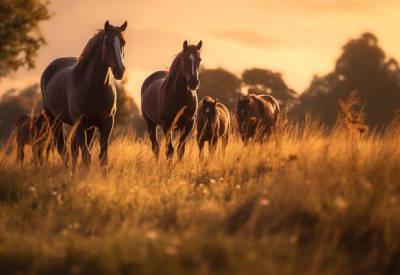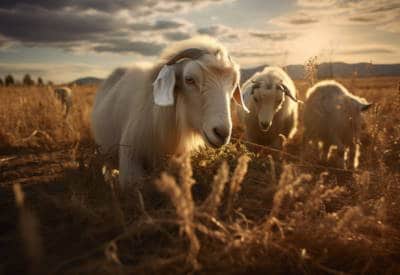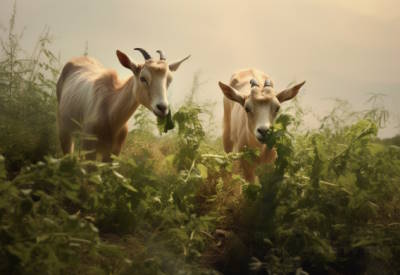We’ve all been there. You’re out on the farm or perhaps visiting a friend’s barnyard, and you notice the bag of horse treats sitting invitingly on a shelf. Nearby, a curious goat gives you that familiar, pleading look we all find hard to resist. The question quickly pops into your mind: can goats eat horse treats? The short answer is that it’s complicated.
I’ve been a proud goat owner for years, and believe me, the temptation to share treats across species is strong. Especially when those big, expressive goat eyes are begging for just a tiny nibble. But, as with all things related to our furry and hoofed companions, it’s essential to ensure what we offer is safe and nutritious for them.
In this article, we’ll dive deep into the dietary needs of goats, explore the makeup of horse treats, and ultimately equip you with the knowledge to make informed snacking decisions for your beloved animals. Buckle up; it’s going to be a delicious ride!

Understanding the Dietary Needs of Goats
Ah, goats – those quirky, charismatic animals we adore. Whether you’re a goat owner or simply a goat admirer, knowing what these animals need to eat is fundamental. Let’s delve into the dietary world of goats.
Basic diet and nutritional requirements for goats
Goats, much like us humans, thrive on a balanced diet. For these animals, it’s all about the right mix of vitamins, minerals, and essential nutrients. The foundation of a goat’s diet is usually forage – think hay, pasture, or browse.
Depending on their age, health, and purpose (like milking or meat production), the nutritional demands can vary. Pregnant or lactating goats, for instance, have different dietary needs compared to idle goats.
Common foods goats eat
A stroll in a field with a goat can be quite an enlightening experience. They might nibble on grass, leaves, shrubs, and even some weeds. Many farmers also offer grains or pelletized feeds to supplement their diet, ensuring they get the right balance of nutrients.
What goats should avoid in their diet
Don’t be fooled by their indiscriminate munching! Certain foods and plants are a big no-no for goats. Some can be outright toxic. Plants like oleander, azaleas, and certain types of ivy can be harmful. Also, avoid feeding them large amounts of fruits or processed foods.
[GoatAffiliate]
What Are Horse Treats Made Of?
Horse treats! They’re a big hit in the equestrian world, and for good reason. These treats are designed to make our equine friends neigh in delight. But what’s inside these delectable nibbles?
Common ingredients found in horse treats
If you’ve ever sneaked a peek at the ingredient list on a packet of horse treats, you’ll notice a list that might look somewhat familiar. Common ingredients include oats, molasses, corn, wheat, and sometimes flavor-enhancing items like apple or carrot bits.
Varieties and flavors of horse treats
Just as we humans relish variety in our snacks, horses enjoy a plethora of flavors. From apple and carrot to mint and even molasses – horse treats come in a delightful range of flavors.
The nutritional makeup of typical horse treats
While these treats are designed to be tasty, they also pack a nutritional punch. Many are rich in fibers, have a certain percentage of protein, and offer energy. Remember, though, they’re treats – not main meals!
Possible Concerns When Feeding Goats Horse Treats

Okay, we get it. Those horse treats look so tempting, even for goats. But before you let your goat have a bite, consider a few things.
Difference in digestive systems of goats and horses
Horses and goats, though both herbivores, have distinct digestive systems. While horses are hindgut fermenters, goats are ruminants. This means they digest and process foods differently. What works for a horse might not always work for a goat.
Potential hazards in horse treats for goats
Not all horse treats are created equal, and some might contain ingredients or additives that aren’t ideal for goats. For instance, a treat too rich in molasses might cause digestive upsets in goats.
How certain ingredients might affect goat health
Even ingredients that are generally safe can pose problems if fed in excess. Too much grain, for example, can lead to bloating or other health issues in goats.
Safe Ways to Introduce Horse Treats to Goats

If you’re still keen on sharing those horse treats with your goat buddy, do so with a touch of caution. Here’s how.
Quantity and frequency
Moderation is key! Start with a small piece and see how your goat reacts. Don’t make horse treats a daily delicacy; think of them as an occasional snack.
Monitoring your goat’s reactions and health
After treating your goat, keep a watchful eye. Look out for signs of contentment or any unusual behavior. Check for any digestive upsets or changes in their habits.
Signs that the treat might not be suitable for your goat
If your goat becomes lethargic, shows signs of bloating, or seems off in any way, it might be best to avoid that particular treat in the future.
Alternative Treats Suitable for Goats

The universe of treats isn’t limited to what’s designed for horses. Let’s explore what else is on the goat gourmet menu!
Homemade goat treat recipes
Feel like playing chef for your goat? There are plenty of simple recipes online. Think oat and apple balls or barley treats. Making them at home allows you to control the ingredients and ensure they’re safe and nutritious.
Store-bought options that are safe for goats
Many pet stores or farm supply shops carry treats specifically designed for goats. These are formulated keeping in mind the goat’s dietary needs.
Tips for making treat time beneficial and enjoyable
Use treats as rewards for good behavior or during training sessions. Not only does this make treat time beneficial, but it also strengthens the bond between you and your goat.
What Other Animal Fodder Can Goats Eat Apart from Horse Treats?

When it comes to feeding goats, there’s a vast array of options beyond the traditional grains and greens. Many goat owners, in their quest to provide a diverse and nutritious diet, often wonder about other animal fodders. Are they beneficial or harmful? Let’s munch our way through some common options.
Timothy Hay
Is it good for goats? Absolutely. Timothy hay is a fantastic source of fiber for goats. It’s typically lower in protein and calcium than alfalfa, making it a well-balanced choice for adult goats that aren’t producing milk. It aids in digestion and promotes dental health. Plus, most goats find it delicious!
Read More: Can Goats Eat Timothy Hay? Unveiling The Full Story
Alfalfa
Beneficial for the goats? Indeed, yes. Alfalfa is rich in protein, vitamins, and minerals. It’s especially beneficial for lactating does, young growing goats, and those that are pregnant because of its high calcium content. However, moderation is key. Feeding too much alfalfa can lead to urinary calculi in male goats or cause overconditioning (excessive fat).
Read More: Can Goats Eat Alfalfa? Ultimate Healthy Feeding Guide
Straw
A tasty treat for goats? Well, not so much. While straw can be used as bedding, it’s not a primary food source for goats. It lacks the essential nutrients that goats need to thrive. They might nibble on it out of curiosity or if other more nutritious options aren’t available, but it shouldn’t be their mainstay.
Read More: Can Goats Eat Straw? Debunking Myths & Exploring Facts
Sweet Feed
Should goats indulge? With caution. Sweet feed, often used for horses, contains grains mixed with molasses, making it a delectable treat. However, it’s quite rich and can lead to obesity, bloating, or other digestive issues if overfed to goats. It’s okay for an occasional treat, but it shouldn’t make up a significant portion of their diet.
Read More: Can Goats Eat Sweet Feed? 5 Excellent Benefits
Beet Pulp
A good choice for goats? Yes, in moderation. Beet pulp is a byproduct from the sugar beet industry and is often given as a supplement to various farm animals. It’s a good source of digestible fiber for goats, aiding in digestion and helping those who might need to gain a bit of weight. However, like all foods, it should be introduced gradually and fed in conjunction with a balanced diet.
Read More: Can Goats Eat Beet Pulp? 7 Excellent Benefits
Can goats eat horse treats – final thoughts
So, after munching through the details, where do we land on the “can goats eat horse treats” debate? Well, while these treats might make horses trot with joy, for our goat friends, it’s a bit more nuanced. Goats have their own unique dietary needs and digestive quirks, and what sends a horse galloping in glee might just leave a goat feeling a tad grumbly in the tummy.
In the grand barnyard of life, every creature has its preferred treats. While sharing is a gesture of love, it’s always best to ensure that a shared snack is both delightful and digestible. Here’s to happy, healthy, and well-fed four-legged friends!
Related Articles:
